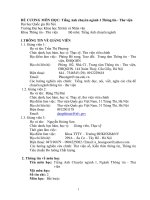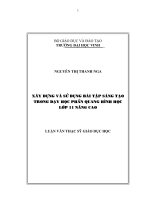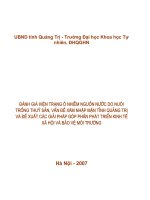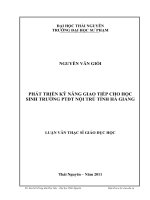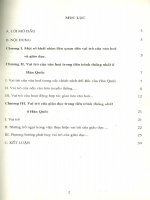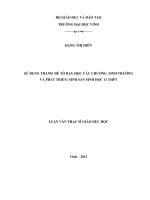45test no4 ngoại ngữ 11 bùi thanh vân thư viện giáo dục tỉnh quảng trị
Bạn đang xem bản rút gọn của tài liệu. Xem và tải ngay bản đầy đủ của tài liệu tại đây (41.69 KB, 3 trang )
<span class='text_page_counter'>(1)</span><div class='page_container' data-page=1>
<b> 45 MINUTE TEST - No4</b>
<i>A.</i> MULTIPLE CHOICE
<i>I.</i> <i>Circle the word whose underlined part is pronounced differently from the others (1.0)</i>
<b>1: A. dedicates</b> <b>B. enlists</b> <b>C. undertakes</b> <b>D. lands</b>
<b>2: A. robbed </b> <b>B. stopped </b> <b>C. equipped </b> <b>D. swapped</b>
<b>3: A. watched </b> <b>B. marched</b> <b>C. matched </b> <b>D. indulged</b>
<b>4: A. lunched </b> <b>B. thatched </b> <b>C. managed </b> <b>D. reached</b>
<i>II.</i> <i>Circle the best answer (4.0)</i>
<b>1: </b>My uncle, who is an accomplished guitarist, taught me how to play it.
<b>A. well-trained</b> <b>B. well-done</b> <b>C. well-educated</b> <b>D. well-equipped</b>
<b>2: </b>Over 51 per cent of households have two or more television sets.
<b>A. families</b> <b>B. shops</b> <b>C. barns</b> <b>D. farms</b>
<b>3: </b>Other pursuits include: listening to music, do-it-yourself home improvements, and gardening.
<b>A. betterment </b> <b>B. employment</b> <b>C. agreement</b> <b>D. treatment</b>
<b>4: </b>The 14th<sub> Asian Games in Busan, 9919 participants from 42 countries gathered to compete.</sub>
<b>A. collected</b> <b>B. assembled</b> <b>C. understood</b> <b>D. picked</b>
<b>5: </b>I have a modest little glass fish tank where I keep a variety of little dishes.
<b>A. small</b> <b>B. simple</b> <b>C. tiny</b> <b>D. shy</b>
<b>6: </b>My Dad doesn’t speak Chinese, and ……….
<b>A. my Mom does neither</b> <b>B. </b>my Mom doesn’t too<b>C. so doesn’t my Mom D. </b>neither does my Mom
<b>7: </b>It was ……… that she bought him a present.
<b>A. the shop</b> <b>B. at the shop </b> <b>C. the shop’s</b> <b>D. of the shop</b>
<b>8: </b>Neither her friends nor Mary ……… TV at 8 o’clock last night.
<b>A. watched</b> <b>B. watches</b> <b>C. was watching</b> <b>D. were watching</b>
<b>9: </b>She neither ……… nor ……….
<b>A. didn’t write/ phoned </b> <b>B. </b>wrote/ didn’t phone <b>C. </b>didn’t write/ didn’t phone <b>D. wrote/ phoned</b>
<b>10: </b>Have you found the bike ………?
<b>A. has just broken</b> <b>B. broke</b> <b>C. I bought for you</b> <b>D. stood by the tree</b>
<b>11: </b>Whenever I find a book ……… cover is beautiful I buy it immediately.
<b>A. whose</b> <b>B. which</b> <b>C. of which </b> <b>D. that </b>
<b>12: </b>It was the man ……… to the Prime Minister’s house.
<b>A. invited </b> <b>B. that was invited </b> <b>C. who was invited </b> <b>D. was invited</b>
<b>13: </b>The hotel has special ……… for disabled atheletes.
<b>A. effort</b> <b>B. acquatic</b> <b>C. facilities </b> <b>D. advancing</b>
<b>14: </b>Your help was ……… appreciated.
<b>A. great </b> <b>B. greatly</b> <b>C. greatful</b> <b>D. greatedly</b>
<b>15: </b>The house we are living ……… is not in good condition.
<b>A. in</b> <b>B. in it </b> <b>C. for it</b> <b>D. of it</b>
<b>16: </b>My wife had never been to Hue and ……… I.
<b>A. never have </b> <b>B. neither have</b> <b>C. neither had</b> <b>D. neither did</b>
<b>17: </b>Is it true that the ……… between the original book and this new film is very faint?
<b>A. relative</b> <b>B. relation</b> <b>C. relationship</b> <b>D. related</b>
<b>18: </b>Have you got enough paint ………, or should I get some more?
<b>A. to be going to go on with</b> <b>B. to go on with </b> <b>C. to be going on with</b> <b>D. All are correct.</b>
<b>19: </b>My sister reached a reasonable level of ……… in her English.
<b>A. competent</b> <b>B. competenence </b> <b>C. competition </b> <b>D. competitive</b>
<b>20: </b>It’s said that there are more people ……… at this time of the year so prices are high.
<b>A. bought</b> <b>B. buy </b> <b>C. to buy</b> <b>D. buying</b>
</div>
<span class='text_page_counter'>(2)</span><div class='page_container' data-page=2>
<i>I.</i> <i>Read the passage and decide whether each of the statements is true (T) or false (F) (1.0)</i>
The Asian Games, also called the Asiad, is a multi-sport event held every four years among
atheletes from all over Asia. The games are regulated by the Olympic Council of Asia (OCA) under
the supervision of the International Olympic Committee. Medals are awarded in each event, with
gold for the first place, silver for second and bronze for third, a tradition which started in 1951.
Competitors are entered by a National Olympic Committee to represent their country of
citizenship. National anthems and flags accompany the medal ceremonies, and tables showing the
number of medals won by each country are widely used.
<b>1: </b>The Asian Games is held every four years among atheletes from all over the world. ___
<b>2: </b>The games are regulated by the Olympic Council of Asia under the supervision of the
International Olympic Committee. ___
<b>3: </b>Only gold medals were awarded in each event in 1951. ___
<b>4: </b>Competitors are entered for the games to represent their country of citizenship. ___
<i>II. Circle the word or phrase among A, B, C or D that best fills in the blank (1.0)</i>
Recreation is the use of (1) ……… in a manner not designed for financial gain, (2) ……… in many
ways it is a therapeutic refreshment of one’s body or mind. While leisure is more likely a form of
entertainment or rest, recreation is active for the participant but in a refreshing and diverting (3)
………. As people in the world’s wealthier regions lead increasingly sedentary life styles, the (4) ………
for recreation has grown. The rise of so called active vacations exemplifies this trend.
<b>1: A. money</b> <b>B. time</b> <b>C. love</b> <b>D. luck</b>
<b>2: A. so </b> <b>B. because </b> <b>C. though </b> <b>D. or</b>
<b>3: A. manner </b> <b>B. behavior</b> <b>C. treatment </b> <b>D. way</b>
<b>4: A. requirement </b> <b>B. need </b> <b>C. demand </b> <b>D. request</b>
<i>C.</i> WRITING <i>Make meaningful sentences with the cues given (1.5)</i>
1. My stamp collection/ began/ I/ was/ 11-year-old boy.
………
2. that time,/ English teacher/ used give out/ colourful pictures/ students/ who/ good at/ subject.
………
3. I/ loved/ pictures/ and/ kept them/ carefully/ a book.
………
4. Then/ father/ advised/ me/ collect stamps.
………
<i>D.</i> LISTENING<i>Listen to the teacher and fill in the blank with one word you hear (1.5)</i>
</div>
<span class='text_page_counter'>(3)</span><div class='page_container' data-page=3>
<b>KEY</b>
<b>A.</b> (0.25/ 1) <i>I.</i><b>1: D 2: A </b> <b>3: D</b> <b>4: C</b> <i>II. </i><b>1: A</b> <b>2: A</b> <b>3: A</b> <b>4: B</b> <b>5: A </b> <b>6: D</b>
<b>7: B </b> <b>8: C</b> <b>9: D </b> <b>10: C</b> <b>11: A </b> <b>12: C </b> <b>13: C </b> <b>14: B</b> <b>15: A</b> <b>16: C </b> <b>17: B </b> <b>18: C </b> <b>19: B </b> <b>20: D</b>
<b>B.</b> (0.25/ 1) <i>I.</i><b>1: F 2: T </b> <b>3: F</b> <b>4: T</b> <i>II. </i><b>1: A</b> <b>2: C</b> <b>3: A</b> <b>4: B</b>
<b>C.</b> (0.25/ 2 correct added elements)
1. My stamp collection began when I was an 11-year-old boy.
2. At that time, my English teacher used to give out colourful pictures to students who were good at
her/ subject.
3. I loved those/ the pictures and kept them carefully in a book.
4. Then my father advised me to collect stamps.
<b>D.</b> (0.25/ 1) [Tapescript: Bài tập Tiếng Anh 11\ Unit 14\ Reading\ Part 1\ page 92]
</div>
<!--links-->




